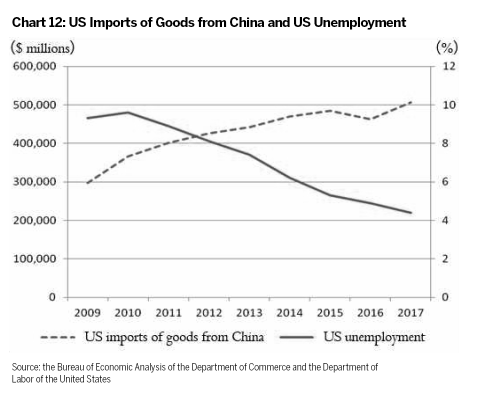The facts and China's position on China-US trade friction
China Daily | Updated: 2018-09-26 08:00
4. Internationalizing domestic issues and politicizing economic and trade issues
The current US administration, in response to domestic political issues, is choosing to internationalize domestic issues and politicize economic and trade issues, and blaming other countries for its own problems.
It has erroneously attributed unemployment caused by domestic policy and institutional flaws to international trade. The US administration has accused other countries of "stealing US jobs through unfair trade". China, as the biggest source of the US trade deficit, is a convenient primary target. However, statistics from the United Nations show that between 2001 and 2017, China-US trade expanded by a factor of 4.4, and yet unemployment in the US dropped from 5.7 percent to 4.1 percent. In particular, while US imports from China surged from 2009 onward, unemployment in the US saw a steady decline during the same period. The causal relationship between imports of goods and job losses, as claimed by the US administration, does not exist (see Chart 12). A report from the US Congressional Research Service in 2017 reveals that between 2010 and 2015, the number of US manufacturing jobs rose by 6.8 percent even though US imports from China in that sector increased by 32.4 percent. 71

In fact, unemployment of some social groups in the US is caused by flaws in domestic economic policy and the absence of proper redistribution and reemployment mechanisms against the backdrop of technological advances and economic restructuring. A study by Ball State University in the State of Indiana finds out that almost 88 percent of the 5.6 million jobs lost in manufacturing in the US between 2000 and 2010 can be attributed to productivity growth. 72 In a market economy where all production factors are in flux, no job lasts forever. The evolution of comparative advantages of the US has had different impacts on job creation in different industries. Decrease of jobs in some industries such as traditional manufacturing is a normal phenomenon in the course of economic development and structural adjustment. The US government should have adapted to the overall trend of economic structural adjustment, taking proactive and effective measures to improve redistribution and reemployment and to help the unemployed find jobs in emerging industries. However, constrained by its traditional distribution mechanism and vested interests, the US government has failed to establish appropriate redistribution and reemployment mechanisms in time. The result has been the build-up of long-standing unemployment among some social groups. This has provided the breeding ground for political populism and isolationism.
The current US administration's attempt to blame international trade and exporting countries for domestic unemployment is not supported by facts; it aims to deflect public attention in the face of intractable domestic political problems. Without truly resolving its own deep-seated structural problems, the US attempt to bring the manufacturing sector back home through protectionist measures is a completely counter-productive move. This beggar-thy-neighbor and lose-lose approach runs counter to economic rules and will only make the world economy less efficient and trigger opposition from countries around the globe. The US will do as much damage to itself as it will to others.
























